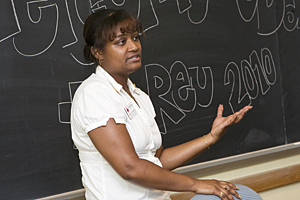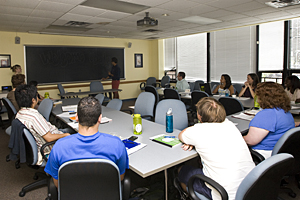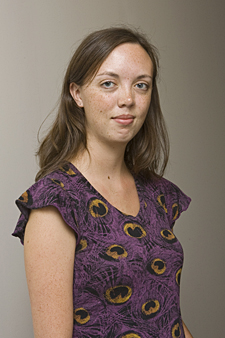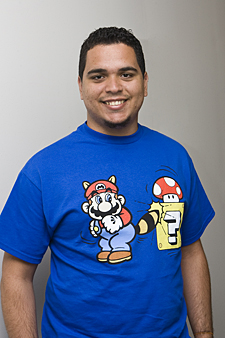ADVERTISEMENT
- Rozovsky wins prestigious NSF Early Career Award
- UD students meet alumni, experience 'closing bell' at NYSE
- Newark Police seek assistance in identifying suspects in robbery
- Rivlin says bipartisan budget action, stronger budget rules key to reversing debt
- Stink bugs shouldn't pose problem until late summer
- Gao to honor Placido Domingo in Washington performance
- Adopt-A-Highway project keeps Lewes road clean
- WVUD's Radiothon fundraiser runs April 1-10
- W.D. Snodgrass Symposium to honor Pulitzer winner
- New guide helps cancer patients manage symptoms
- UD in the News, March 25, 2011
- For the Record, March 25, 2011
- Public opinion expert discusses world views of U.S. in Global Agenda series
- Congressional delegation, dean laud Center for Community Research and Service program
- Center for Political Communication sets symposium on politics, entertainment
- Students work to raise funds, awareness of domestic violence
- Equestrian team wins regional championship in Western riding
- Markell, Harker stress importance of agriculture to Delaware's economy
- Carol A. Ammon MBA Case Competition winners announced
- Prof presents blood-clotting studies at Gordon Research Conference
- Sexual Assault Awareness Month events, programs announced
- Stay connected with Sea Grant, CEOE e-newsletter
- A message to UD regarding the tragedy in Japan
- More News >>
- March 31-May 14: REP stages Neil Simon's 'The Good Doctor'
- April 2: Newark plans annual 'wine and dine'
- April 5: Expert perspective on U.S. health care
- April 5: Comedian Ace Guillen to visit Scrounge
- April 6, May 4: School of Nursing sponsors research lecture series
- April 6-May 4: Confucius Institute presents Chinese Film Series on Wednesdays
- April 6: IPCC's Pachauri to discuss sustainable development in DENIN Dialogue Series
- April 7: 'WVUDstock' radiothon concert announced
- April 8: English Language Institute presents 'Arts in Translation'
- April 9: Green and Healthy Living Expo planned at The Bob
- April 9: Center for Political Communication to host Onion editor
- April 10: Alumni Easter Egg-stravaganza planned
- April 11: CDS session to focus on visual assistive technologies
- April 12: T.J. Stiles to speak at UDLA annual dinner
- April 15, 16: Annual UD push lawnmower tune-up scheduled
- April 15, 16: Master Players series presents iMusic 4, China Magpie
- April 15, 16: Delaware Symphony, UD chorus to perform Mahler work
- April 18: Former NFL Coach Bill Cowher featured in UD Speaks
- April 21-24: Sesame Street Live brings Elmo and friends to The Bob
- April 30: Save the date for Ag Day 2011 at UD
- April 30: Symposium to consider 'Frontiers at the Chemistry-Biology Interface'
- April 30-May 1: Relay for Life set at Delaware Field House
- May 4: Delaware Membrane Protein Symposium announced
- May 5: Northwestern University's Leon Keer to deliver Kerr lecture
- May 7: Women's volleyball team to host second annual Spring Fling
- Through May 3: SPPA announces speakers for 10th annual lecture series
- Through May 4: Global Agenda sees U.S. through others' eyes; World Bank president to speak
- Through May 4: 'Research on Race, Ethnicity, Culture' topic of series
- Through May 9: Black American Studies announces lecture series
- Through May 11: 'Challenges in Jewish Culture' lecture series announced
- Through May 11: Area Studies research featured in speaker series
- Through June 5: 'Andy Warhol: Behind the Camera' on view in Old College Gallery
- Through July 15: 'Bodyscapes' on view at Mechanical Hall Gallery
- More What's Happening >>
- UD calendar >>
- Middle States evaluation team on campus April 5
- Phipps named HR Liaison of the Quarter
- Senior wins iPad for participating in assessment study
- April 19: Procurement Services schedules information sessions
- UD Bookstore announces spring break hours
- HealthyU Wellness Program encourages employees to 'Step into Spring'
- April 8-29: Faculty roundtable series considers student engagement
- GRE is changing; learn more at April 15 info session
- April 30: UD Evening with Blue Rocks set for employees
- Morris Library to be open 24/7 during final exams
- More Campus FYI >>
1:52 p.m., July 9, 2010----Thirteen undergraduate students from nine universities around the world, including Puerto Rico and Japan, are taking part in this year's summer research program at the University of Delaware's Disaster Research Center (DRC).
Havidán Rodríguez, deputy provost, said he believes the center's summer research experience for undergraduates (REU) is beneficial to both the University and the students who take part.
“The University of Delaware is privileged to have the oldest and one of the leading social science disaster research centers in the world,” Rodríguez said. “For the past 45 years, DRC researchers have pioneered work focusing on the societal and organizational aspects of disasters and have had a strong impact on the growth and development of the field of disasters.
“The DRC-REU allows us to continue to expand and strengthen the reputation, prominence, and contributions of the University of Delaware's DRC in these important areas of inquiry. Moreover, the REU program epitomizes the importance of the DRC and the University of Delaware in the disaster research field, both nationally and internationally.”
In the program, students work with leading scholars and researchers on state-of-the-art research projects that focus on issues such as disaster mitigation, preparedness, response, recovery, warnings and technology, and disaster vulnerability and resilience.
Rodríguez said it is noteworthy that this is the only program of its kind in the country, and it is funded by the National Science Foundation, the Department of Defense, and the University of Delaware.
Training the next generation of research leaders
Brittany Scott, a master's degree student and research assistant with the DRC, explained, “The goal of our program is to train the next generation of disaster researchers. We hope that this experience will encourage their interest in the field and help them in their future academic endeavors. We want to expose them to both the academic and practitioner side of the disaster field so they engage in classes on research and have presentations by a variety of speakers involved in emergency management, research, emergency response and preparedness.”
Lauren Barsky, a doctoral level student assisting with the DRC program, talked about the educational process for students in the summer program. “In the early weeks of the program students participate in morning sessions on research methods and social science aspects of disasters,” she said. “In the afternoon the students learn about DRC projects or hear presentations from leading disaster scholars and practitioners through the Invited Speakers Series. Toward the end of summer, students focus mainly on their own independent research projects.”
The class will take a trip to Broomfield, Colo., for the Natural Hazards Research and Application Workshop. “The workshop has representatives from many sectors (private, public, non-profit), and various disciplines and encourages provocative discussions on issues facing the disaster community,” Barsky said.
The students
Among the students participating in the DRC summer program is David Garcia, a rising junior psychology student from Loyola University in New Orleans who is studying the 2003 Rhode Island nightclub fire that claimed 100 lives. Garcia said he chose to join the program because “I thought it would be a good experience, and I wanted to broaden my horizons when it comes to my studies, just to know what all is out there and the different options within the psychology field.”
Garcia said he has gained “hands on experience” and that “just being able to write my own paper and do my own research is a huge learning experience.”
Elisa Kropat, a senior studying civil engineering at the University of Delaware, is conducting research on earthquake triggered landslide hazard mapping, to develop maps that can predict whether a slope or landmass will slide due to a certain magnitude of earthquake. Kropat is focusing her studies on a specific region in southern California.
“I'm hoping just to get experience in research and what the research process is about in hopes that it will prepare me for graduate school,” Kropat said, adding that disaster research is important because “there's a lot of damage and destruction caused by disasters, to infrastructure and to human life, and if we can help mitigate that damage, that would be a really good thing.”
Robin Cassedy, a rising senior from the University of Denver who studies political science, heard about the Disaster Research Center through an email sent out by her major adviser and said she jumped at the opportunity.
Cassedy is studying media coverage of the Haiti earthquake, specifically looking at the media's “possible tendency to perpetrate gender stereotypes in their coverage of Haiti, specifically through photographs.”
Cassedy said she got interested in disaster research because “it's very strange to me that humans can consider themselves masters of the planet but we're still very much at the mercy of Mother Nature. The social science aspect of it and the political aspect of it really interest me because disasters expose huge weaknesses in our social system.”
Emmanuel Martinez, a sociology student at the University of Puerto Rico in Mayaguez, is studying stranger aid phenomenon in the 2003 Rhode Island nightclub fire. The phenomenon concerns “how strangers in a fire or another hazard feel like helping others and try to save their lives without knowing them,” he said. “It is known that people who are together, who are friends, will try to help each other, will try to get out together, but if we don't know each other, it's not the same.”
Martinez said he was drawn to disaster research because he “feels like helping people, and everyday we see different disasters and how the need for knowing how to react to different disasters is important. We're seeing how hazards and emergencies are occurring and we need to know how to react.”
Article by Adam Thomas
Photos by Ambre Alexander






